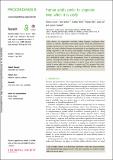Files in this item
Human adults prefer to cooperate even when it is costly
Item metadata
| dc.contributor.author | Curioni, Arianna | |
| dc.contributor.author | Voinov, Pavel | |
| dc.contributor.author | Allritz, Matthias | |
| dc.contributor.author | Wolf, Thomas | |
| dc.contributor.author | Call, Josep | |
| dc.contributor.author | Knoblich, Günther | |
| dc.date.accessioned | 2022-04-28T12:30:10Z | |
| dc.date.available | 2022-04-28T12:30:10Z | |
| dc.date.issued | 2022-04-27 | |
| dc.identifier | 278721476 | |
| dc.identifier | 3bdee71b-bea2-4886-88c2-b857626bbb27 | |
| dc.identifier | 85128881132 | |
| dc.identifier | 000793192300005 | |
| dc.identifier.citation | Curioni , A , Voinov , P , Allritz , M , Wolf , T , Call , J & Knoblich , G 2022 , ' Human adults prefer to cooperate even when it is costly ' , Proceedings of the Royal Society of London Series B: Biological Sciences , vol. 289 , no. 1973 , 20220128 . https://doi.org/10.1098/rspb.2022.0128 | en |
| dc.identifier.issn | 0962-8452 | |
| dc.identifier.other | ORCID: /0000-0002-8597-8336/work/112333776 | |
| dc.identifier.uri | https://hdl.handle.net/10023/25257 | |
| dc.description | Funding: This research was supported by the European Research Council (ERC) under the European Union’s Seventh Framework Program [FP7/2007-2013/ERC Grant 609819], project SOMICS. | en |
| dc.description.abstract | Joint actions are cooperative activities where humans coordinate their actions to achieve individual and shared goals. While the motivation to engage in joint action is clear when a goal cannot be achieved by individuals alone, we asked whether humans are motivated to act together even when acting together is not necessary and implies incurring additional costs compared to individual goal achievement. Using a utility-based empirical approach, we investigated the extent of humans' preference for joint action over individual action, when the instrumental costs of performing joint actions outweigh the benefits. The results of five experiments showed that human adults have a stable preference for joint action, even if individual action is more effective to achieve a certain goal. We propose that such preferences can be understood as ascribing additional reward value to performing actions together. | |
| dc.format.extent | 9 | |
| dc.format.extent | 531483 | |
| dc.language.iso | eng | |
| dc.relation.ispartof | Proceedings of the Royal Society of London Series B: Biological Sciences | en |
| dc.subject | Utility | en |
| dc.subject | Joint action | en |
| dc.subject | Costs | en |
| dc.subject | Cooperation | en |
| dc.subject | BF Psychology | en |
| dc.subject | DAS | en |
| dc.subject.lcc | BF | en |
| dc.title | Human adults prefer to cooperate even when it is costly | en |
| dc.type | Journal article | en |
| dc.contributor.sponsor | European Research Council | en |
| dc.contributor.institution | University of St Andrews. Centre for Social Learning & Cognitive Evolution | en |
| dc.contributor.institution | University of St Andrews. School of Psychology and Neuroscience | en |
| dc.identifier.doi | 10.1098/rspb.2022.0128 | |
| dc.description.status | Peer reviewed | en |
| dc.identifier.grantnumber | 609819 | en |
This item appears in the following Collection(s)
Items in the St Andrews Research Repository are protected by copyright, with all rights reserved, unless otherwise indicated.

